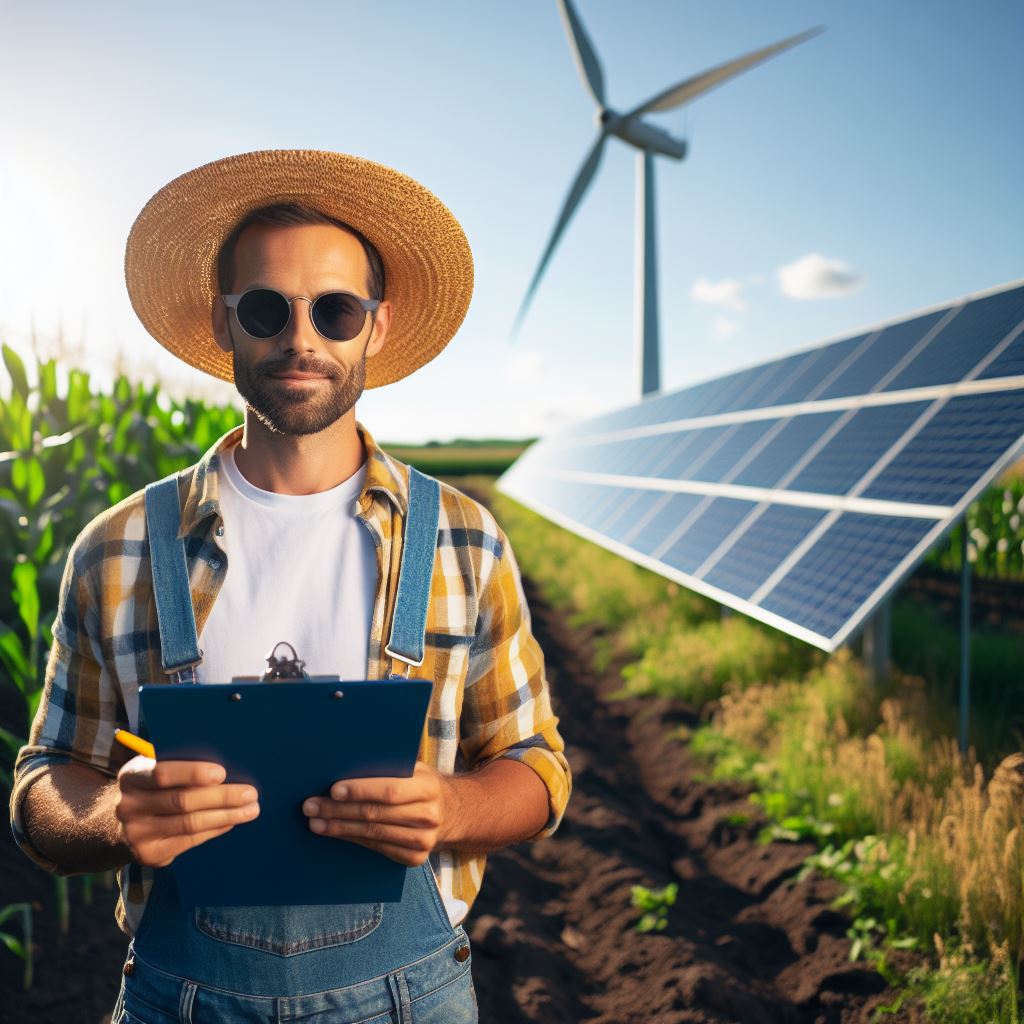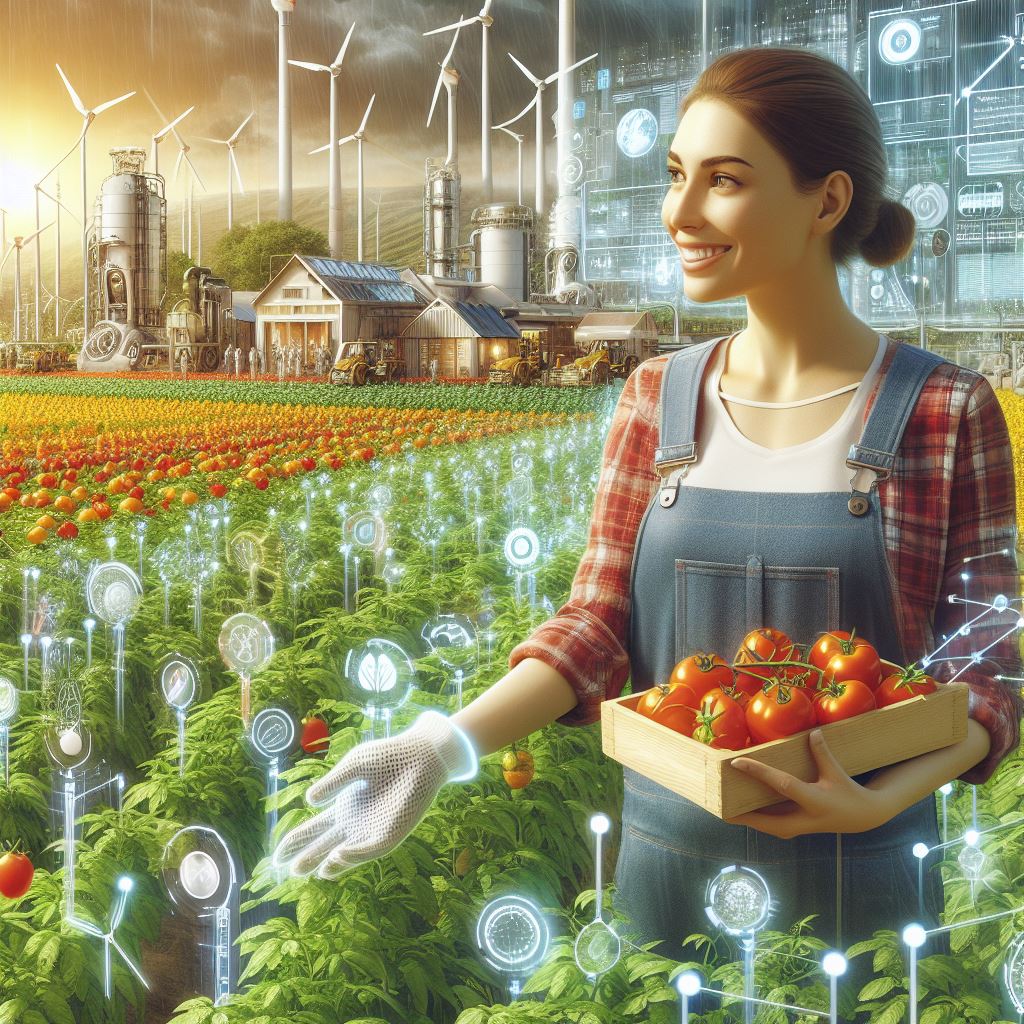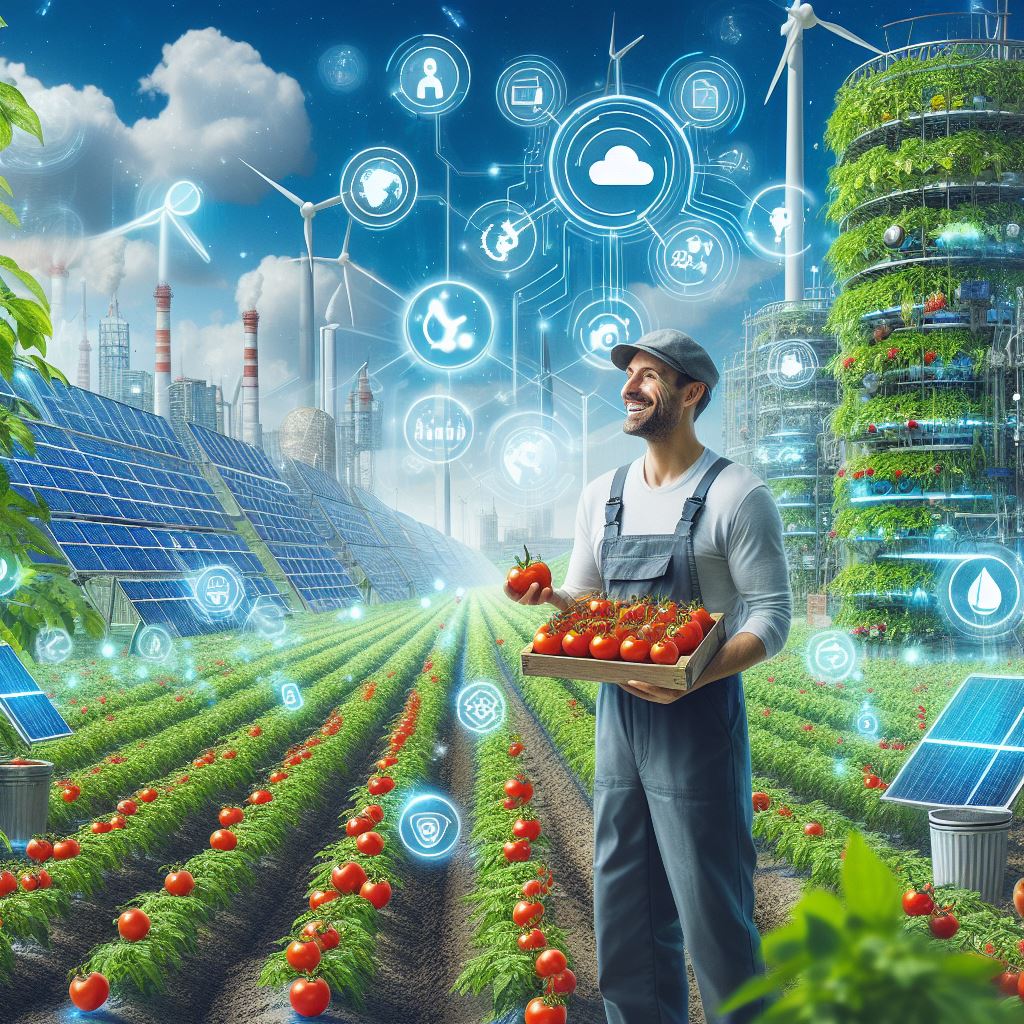Introduction
Sustainable agriculture
Sustainable agriculture encompasses farming methods that prioritize environmental protection and long-term viability.
It involves reducing the use of harmful chemicals, minimizing soil erosion, and optimizing water and energy management.
This approach ensures the preservation of natural resources and promotes biodiversity.
Importance of sustainable agriculture in today’s world
In today’s world, the significance of sustainable agriculture cannot be overstated.
Climate change is becoming increasingly threatening, resulting in extreme weather events and unpredictable growing conditions.
By adopting sustainable farming practices, we can mitigate greenhouse gas emissions, adapt to changing climates, and build resilience in our food systems.
Purpose of the blog post
The purpose of this blog post is to offer an investment guide for sustainable agriculture.
As the demand for sustainably produced food continues to rise, investing in this sector presents a promising opportunity.
This guide will provide information on the various investment options available in sustainable agriculture, including agricultural technology, organic farming, and regenerative practices.
Furthermore, this blog post will highlight the potential benefits and risks associated with investing in sustainable agriculture.
It will explore the financial and environmental returns of such investments and discuss the importance of due diligence when selecting sustainable agriculture ventures to support.
In essence, sustainable agriculture is crucial for the future of our planet and food systems.
This blog post aims to serve as a comprehensive investment guide, enabling readers to make informed decisions and contribute to the growth of sustainable agriculture.
Benefits of Investing in Sustainable Agriculture
Investing in sustainable agriculture offers a range of benefits that extend beyond financial gains.
By adopting sustainable practices, farmers can positively impact the environment, boost local communities, and improve the health of consumers.
Transform Your Agribusiness
Unlock your farm's potential with expert advice tailored to your needs. Get actionable steps that drive real results.
Get StartedThis section explores the various benefits of investing in sustainable agriculture.
Environmental benefits
Sustainable agriculture practices prioritize the preservation of natural resources and minimize negative environmental impacts.
1. Conservation of soil and water resources
By implementing erosion control measures, such as terracing and contour plowing, sustainable farmers protect the soil from degradation and improve its fertility.
Efficient water management techniques, like drip irrigation, help conserve water resources.
2. Reduction of greenhouse gas emissions
Sustainable agriculture focuses on minimizing the use of synthetic fertilizers and pesticides, which contribute to greenhouse gas emissions.
By utilizing organic and natural fertilizers, such as compost and manure, farmers can reduce their carbon footprint and combat climate change.
Economic benefits
Investing in sustainable agriculture can lead to economic advantages for farmers in the long run.
1. Increased profitability in the long run
Although transitioning to sustainable practices may require initial investments, such as organic certifications or the adoption of new technologies, it can ultimately enhance farm profitability.
Sustainable farms often have lower input costs and improved crop quality, which can generate higher profits over time.
2. Diverse revenue streams through organic farming practices
Organic farming practices, which are integral to sustainable agriculture, allow farmers to tap into growing consumer demand for organic products.
By diversifying their production and offering organic options, farmers can access premium markets and command higher prices for their goods.
Social benefits
Investments in sustainable agriculture positively impact society by promoting community development and providing healthier food choices.
1. Support for local communities and small-scale farmers
Sustainable agriculture contributes to vibrant local economies by supporting small-scale farmers.
As sustainable farming practices often require more manual labor, they create employment opportunities and help revitalize rural areas.
2. Provision of healthier food options
Sustainable agriculture prioritizes the use of organic and natural inputs, resulting in healthier food choices for consumers.
By avoiding synthetic chemicals, sustainable farmers produce food that is free from harmful residues, promoting better nutrition and overall well-being.
Investing in sustainable agriculture not only yields economic returns but also helps protect the environment and support local communities.
By understanding and harnessing the various benefits of sustainable agriculture, investors can contribute to a more sustainable and resilient future.
Read: Agri Startups: Innovation and Growth
Types of Sustainable Agricultural Investments
Sustainable agriculture is not just a buzzword; it is an essential practice that allows us to meet the needs of the present generation without compromising the ability of future generations to meet their own needs.
As we strive to create a more sustainable food system, it is crucial to understand the different types of sustainable agricultural investments that can drive positive change and deliver long-term benefits.
Organic farming
Organic farming is a sustainable agricultural investment that focuses on cultivating crops and raising livestock without the use of synthetic chemicals, genetically modified organisms (GMOs), or hormones.
It promotes the health of the soil, ecosystems, and people, providing a safer and more sustainable alternative to conventional farming practices.
1. Organic certification and its requirements
Organic certification ensures that the products meet stringent organic standards set by regulatory bodies.
Showcase Your Farming Business
Publish your professional farming services profile on our blog for a one-time fee of $200 and reach a dedicated audience of farmers and agribusiness owners.
Publish Your ProfileIt involves inspections, documentation, and adherence to organic farming practices.
2. Market demand for organic products
There is a growing demand for organic products worldwide as consumers become more conscious of the health and environmental impacts of conventional agriculture.
This presents a significant market opportunity for farmers and investors.
Agroforestry
Agroforestry is a sustainable agricultural investment that involves integrating trees or shrubs in agricultural systems.
This practice offers multiple benefits, including improved soil fertility, erosion control, biodiversity conservation, and increased farm productivity.
1. Integration of trees or shrubs in agricultural systems for various benefits
Agroforestry systems combine the cultivation of crops or livestock with the strategic planting of trees or shrubs.
This integration helps improve soil structure, nutrient cycling, and water availability while providing shade and habitat for beneficial organisms.
2. Examples of successful agroforestry initiatives
Many farmers and organizations have successfully implemented agroforestry practices.
For instance, alley cropping, where rows of trees are planted alongside crops, has shown improved yields, carbon sequestration, and economic returns.
Precision agriculture
Precision agriculture is an innovative approach that harnesses technology to optimize resource management and maximize efficiency in farming operations.
It utilizes data analysis, remote sensing, and monitoring systems to make informed decisions in real-time.
1. Utilization of technology to optimize resource management
Precision agriculture utilizes tools like GPS, sensors, and drones to precisely apply fertilizers, water, and other inputs.
This targeted approach reduces waste, minimizes environmental impact, and increases overall productivity.
2. Importance of data analysis and farm monitoring
Collecting data on soil conditions, plant health, and weather patterns enables farmers to make data-driven decisions.
By analyzing this data, farmers can adjust their practices to optimize yield, reduce costs, and minimize the use of resources.
By investing in organic farming, agroforestry, and precision agriculture, individuals and organizations can contribute to sustainable agricultural practices, promote environmental preservation, and secure a resilient and prosperous future for our global food system.
It is crucial to recognize the potential of these investments and support the transition towards a sustainable and regenerative agricultural model.
Read: Strategies for Global Agri Growth

Factors to Consider When Investing in Sustainable Agriculture
Research and due diligence
When considering investments in sustainable agriculture, conducting thorough research and due diligence is crucial.
Investors must understand the specific market and region they plan to invest in.
This involves studying factors such as climate, soil quality, and resource availability.
It is important to evaluate the potential risks and profitability associated with sustainable agriculture investments.
This includes assessing market demand, cost structures, and potential regulatory challenges.
Carrying out comprehensive research will enable investors to make informed decisions and minimize risks.
Long-term commitment
Investing in sustainable agriculture necessitates a long-term commitment.
Unlike conventional farming methods, sustainable agriculture practices often require more time to yield results.
Patience is essential as it takes time for natural processes to restore soil fertility and build resilience.
Ongoing maintenance and adaptation to changing conditions are critical in sustainable agriculture.
Farmers must continuously monitor and adjust their practices to ensure optimal results.
This may involve implementing new techniques, utilizing technology, or adopting innovative strategies to mitigate environmental risks.
Collaboration and partnerships
Collaboration and partnerships play a crucial role in successful sustainable agriculture investments.
Investors should actively seek opportunities to connect with experts, farmers, and organizations in the field.
These partnerships provide access to valuable knowledge and expertise, helping investors make informed decisions and stay updated with the latest industry trends.
Sharing knowledge and resources with industry stakeholders maximizes the impact of sustainable agriculture investments.
By collaborating with various entities, investors can combine their strengths and collectively work towards achieving sustainable agricultural practices.
This may include sharing research findings, implementing joint projects, or supporting initiatives that promote sustainable farming.
In general, investing in sustainable agriculture requires careful consideration of various factors.
Conducting thorough research, demonstrating long-term commitment, and fostering collaboration and partnerships are key to successful investments in sustainable agriculture.
Showcase Your Farming Business
Publish your professional farming services profile on our blog for a one-time fee of $200 and reach a dedicated audience of farmers and agribusiness owners.
Publish Your ProfileBy following these practices, investors can contribute to the growth of sustainable agriculture while generating favorable financial returns.
Read: Farm Products: Market Traditionally & Win
Resources and Support for Sustainable Agricultural Investments
Sustainable agricultural investments require adequate resources and support to ensure their success.
Fortunately, there are various avenues individuals can explore to access the necessary assistance they need.
Government programs and grants
Government programs and grants play a crucial role in supporting sustainable agricultural investments.
Governments worldwide recognize the importance of sustainable agriculture and have established programs that offer financial incentives.
These programs aim to encourage individuals to invest in sustainable practices and mitigate the environmental impact of conventional farming.
Financial incentives can include grants, subsidies, or low-interest loans, which can significantly reduce the financial burden of adopting sustainable practices.
However, it is important to understand the application process and eligibility criteria to ensure that individuals qualify for these financial incentives.
In some cases, specific criteria related to farm size, location, or production methods need to be met to access government support.
Non-profit organizations and agricultural associations
Non-profit organizations and agricultural associations also provide valuable guidance and support for individuals interested in sustainable agriculture.
These organizations are dedicated to promoting sustainable farming practices and help connect individuals with useful resources.
They offer guidance on various aspects, such as farm management, soil health, organic certifications, and marketing strategies.
Additionally, these organizations provide networking opportunities, allowing like-minded individuals to connect and share experiences.
This networking aspect can be incredibly beneficial, as it fosters collaboration and knowledge exchange within the sustainable agriculture community.
Educational materials and courses
Access to educational materials and courses is essential for individuals looking to invest in sustainable agriculture.
Various online platforms and resources provide comprehensive information about sustainable farming practices.
These resources cover a wide range of topics, including soil conservation, water management, crop rotation, and organic pest control.
Online courses and webinars offer more structured learning opportunities, allowing individuals to delve deeper into specific areas of interest.
Continuous education is critical for staying updated with the latest advancements in sustainable agriculture and implementing successful investment strategies.
By expanding their knowledge base, individuals can make informed decisions and maximize the potential of their agricultural investments.
Overall, sustainable agricultural investments require access to resources and support systems that can facilitate their implementation.
Government programs and grants offer financial incentives for individuals to adopt sustainable practices, while non-profit organizations and agricultural associations provide guidance and networking opportunities.
Educational materials and courses equip individuals with the knowledge necessary to make informed decisions and achieve successful investment strategies in sustainable agriculture.
By harnessing these resources and support systems, individuals can contribute to a more sustainable future while reaping the benefits of their agricultural investments.
Read: Agritech in Export: New Trends
Conclusion
Recap of the importance and benefits of sustainable agriculture
Sustainable agriculture plays a crucial role in ensuring food security and preserving our environment. It promotes biodiversity, conserves natural resources, and reduces greenhouse gas emissions.
Encouragement to readers to consider sustainable agriculture as a viable investment option
Investing in sustainable agriculture offers numerous benefits. It not only contributes to the well-being of the planet but also provides opportunities for financial growth and stability.
By supporting sustainable farming practices, investors can contribute to a more sustainable future.
Final thoughts on the future of sustainable agriculture
The future of sustainable agriculture looks promising. As the demand for organic and locally sourced food continues to rise, the market for sustainable agriculture investments will expand.
Embracing sustainable practices is crucial for the long-term success of the agriculture industry.
All in all, sustainable agriculture is more than just a trend; it is a necessity.
By recapitulating the significance and advantages of sustainable farming, we hope to inspire readers to consider this field as a viable investment option.
The future of sustainable agriculture is bright, with opportunities for both environmental and financial growth.
Let us embrace a more sustainable and resilient future for agriculture.




